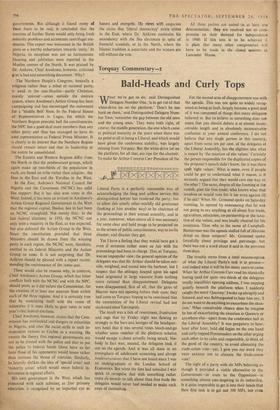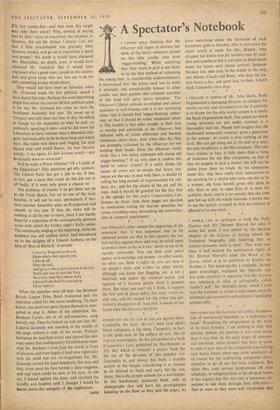Torquay Commentary-2
Bald-Heads and Curly Tops
WHAT we've got to do; said Distinguished Delegate Number One, 'is to get rid of that whist-drive lot on the platform.' Don't be too hard on them,' said Distinguished Delegate Num- ber Two; 'remember the gap between the old ones and the young ones.' They were both right, of course; the middle generation, the one which came to political maturity in the years when there was no point at all in being a Liberal, and which would have given the conference stability, was largely missing from Torquay. But the whist-drive lot on the platform, for all that, are ripe for the abattoir. To make Sir Arthur Comyns Carr President of the Liberal Party is a perfectly reasonable way of acknowledging the long and selfless service this distinguished lawyer has rendered the party; but to allow this utterly other-worldly old gentleman (looking at him another way) to be chairman of the proceedings at their annual assembly, and in a year, moreover, when above all it was necessary for some clear and bold image to be projected on to the screen of public consciousness, was to invite disaster, and disaster they got.
Yet I have a feeling that they would have got it even if someone rather more au fait with the proceedings had been in charge. This, at Torquay, was an unpopular view; the general opinion of the delegates was that Sir Arthur should be taken out- side, weighted, and tossed into the harbour, but I suspect that the obloquy heaped upon his aged head originated in large measure from nothing more rational than disappointment. Delegates were disappointed, first of all, that the gates of Heaven were not opening before their eyes; they had come to Torquay hoping to be convinced that the momentum of the Liberal revival had not slackened since Torrington.
The result was a tide of resentment, frustration and rage that by Friday night was flowing so strongly in the bars and lounges of the headquar- ters hotel that it was several times touch-and-go whether some member of the platform echelon would escape without actually being struck. No- body in fact was; instead, the delegates took it out on the agenda. And it was all done in an atmosphere of adolescent screaming and abrupt bouleversements that I have not heard since I was an undergraduate at the London School of Economics. But when the fuss had subsided I was quick to recognise that with something rather more du monde to talk about than free trade the delegates would never had needed to make such asses of themselves. For the second area of disappointment was with the agenda. This was not quite so widely recog- nised as being at fault, largely because a good deal of it was composed of things that many delegates believed in. But to believe in something does not mean that you should debate it at almost incon- ceivable length and in absolutely inconceivable confusion at your annual conference. I do not believe that any single person in this country, apart from some ten per cent. of the delegates at the Liberal Assembly, has the slightest idea what is meant by 'the taxation of site values.' Certainly the person responsible for the duplicated copies of the proposer's speech didn't know, for it was there spelt 'sight values.' What is more, even if people could be got to understand what it means, is it seriously argued that they would care one way or the other? The same, despite all the foaming at the mouth, goes for free trade; who knows what that involves or would vote for it (or even against it) if he did? When Mr. Grimond spoke on Saturday morning, he opened by announcing that he was not going to say anything at all about free trade, agriculture, eduCation, co-partnership or the taxa- tion of site values, and was loudly cheered for his assurance. Then why in the name of Campbell- Bannerman was the agenda stuffed full of illiterate drivel on these subjects? Mr. Grimond spoke forcefully about privilege and patronage; but there was not a word about it said in the previous three days.
The trouble stems from a total misconception of what the Liberal Party's task is at present— and indeed what it will be for many years to come. When Sir Arthur Comyns Carr read his titanically boring (and for quite two-thirds of the delegates totally inaudible) opening address, I was napping quietly beneath the platform when I suddenly caught the word 'Quemoy.' I woke up abruptly and listened, and was flabbergasted to hear him say, 'I do not want to do anything to exacerbate the situa- tion.' What conceivable chance does he imagine he has of exacerbating the situation in Quemoy or anywhere else—apart from the conference hall at the Liberal Assembly? It was purgatory to hear, hour after hour, bald old fogies on the one hand and curly-topped Promenaders on the other urging each other to be calm and responsible, to think of the good of the country, to avoid alienating the trade-union vote—yes, I give you my word they were anxious not to alienate the trade-union vote!
The sight of a party with six MPs behaving as though it provided a viable alternative to the Government—or even to the Opposition—is something almost awe-inspiring in its imbecility. Is it quite impossible to get it into their heads that their first task is to get not 390 MPs, nor even 270, but twenty-five—and that even this target may take them years? Why, instead of saying that he didn't want to exacerbate the situation in Quemoy, did not Sir Arthur Comyns Carr say that a little exacerbation was precisely what Quemoy needed, and go on to exacerbate it good and proper? No doubt it would have alienated Mr. Macmillan; no doubt, even, it would have alienated Mr. Gaitskell. But it would have expressed what a good many people in the country feel, and given those who saw him say it on the telly something to stay awake about.
They would not have slept on Saturday when Mr. Grimond made the best political speech 1 have heard this year. Perhaps the most heartening single fact about the current British political scene is the way Mr. Grimond has come on since the Southport Assembly last year. He stood up at Torquay and told them the time of day; he talked as though his life depended on what he said—as Politically speaking it does—and he did more for Liberalism in forty minutes than a thousand dele- gates had been able to do in three long and weary days. His voice was sharp and ringing, his eyes blazed blue and awful flames, his hair became untidy—I say again, his hair became untidy—and he actually wore no waistcoat !
Will he make a Prime Minister? Or a Leader of the Opposition? Silly questions get silly answers. The Liberal Party has got a job to do. It has, in fact, got a team that could do this job not at all badly, if it were only given a chance to.
The problem, of course, is to get them not on to the Front Bench, but on to one of the back benches. It will not be easy, particularly if they have another Assembly quite so ill-organised and chaotic as this one. If they do, there will be nothing at all for me to enjoy, since I can hardly hope for a repetition of the unimaginably glorious scene with which the Friday night's Rally ended. The community singing at the beginning, while the audience was still settling down, had introduced us to the delights of a Liberal Anthem, to the tune of 'Men of Harlech.' A sample: Come for England needs you Haste where duty speeds you, Liberals all, Obey the call, And go-o-o where Gri-i-imond leads you Work and vote to beat the Tory Ne-e-ever trust the Labour story Liberal Faith shall be your glory On to victory!
When the speeches were all over, the Brixham British Legion Prize Band re-entered and the chairman called for one more rendering. To their horror, the platform party found themselves com- pelled to sing it. Alone of the celebrities, Mr. Bonham Carter, not at all self-conscious, sang bravely out. Then he looked up and saw that Mr. Ludovic Kennedy was standing in the middle of the stage without a copy of the words. Without hesitation he marched across and shoved his own copy under that undisguisably Establishment nose. And Mr. Bonham Carter kept the words in front of his eyes, and even began to beat time vigorously with his small but not un-Asquithian fist. Mr. Kennedy turned his head hopelessly this way and that; from puce his face turned a deep magenta, and real tears could be seen in his eyes. As for me, I leaned against the door, and clutched the handle, and laughed until I thought I would be heard above the oompahs of the euphonium.
TAPER TAPER



































 Previous page
Previous page